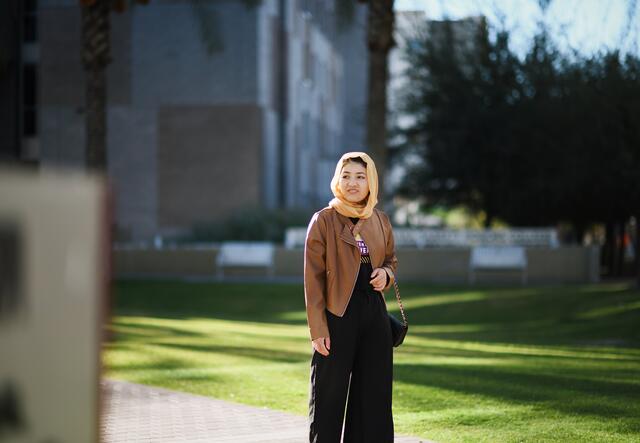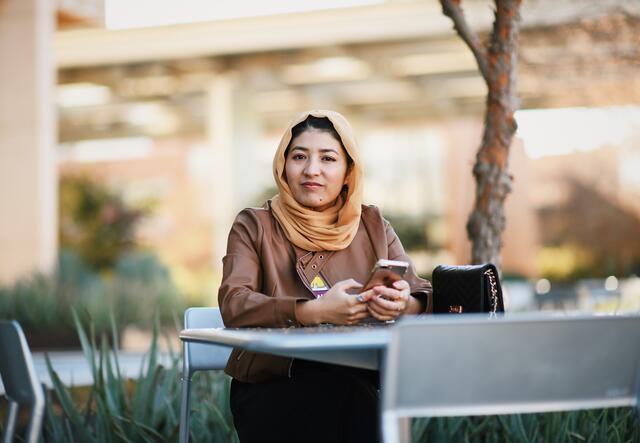
Written by: Nisha Datt, Communications Coordinator
The shock of it all
Mansora, 19, was in the middle of drafting a final essay in her room when she heard her mom call out, “Oh my goodness, the Taliban are here.” Frozen, unable to move, she was in disbelief. “I went to the balcony to look outside…and I could see students and people running. Parents were running to bring their children home from school,” Mansora recalled. Wanting to learn as much information as possible, she listened to the news on T.V. while reading the most recent updates on her phone. Her mom called family members, ensuring they were safe.
Growing up in the province of Ghazni, Mansora was surrounded by a loving and supportive family. “We were a big family of 15 people. I was young at that time. I still remember that long dinner table, and happy faces enjoying each other’s company,” she shared. She was the youngest of four siblings. While in high school, Mansora hoped to one day be a graduate of Kabul University, just like her three elder brothers. In her final year of high school, her father became ill and passed away about six months later. Mansora and her mother made the difficult decision to move to Kabul.
In the weeks that followed the news, Mansora’s life had changed. “I was afraid, unhappy, sad…. I felt like I was in prison – not allowed to go outside,” she said. That isolation affected her deeply to the point where she was not taking care of herself - not eating or sleeping well.

Where there is a will there is a way
Mansora’s university had been preparing, months prior, for their next steps should the Taliban gain control of Kabul. “The Taliban was all around Afghanistan, taking over some provinces. then, at that moment, our university had a meeting with us.” She and her peers did not believe it would happen, but knew they needed to remain vigilant. In order to get their visa to travel out of the country, they needed to get the COVID-19 vaccine. It took Mansora three attempts to get the vaccine at the hospital as there were many people waiting to be helped.
When it came time to pick up her visa, she was fearful of getting caught by the Taliban. As she walked out her front door, fully covered, she said a little prayer for protection and went on her way. “I went outside and saw the Taliban in person. They were close to me, and it was my first time, and I was very afraid – they had their guns,” she remembered. Mansora made it back home safely and remained glued to her phone, checking her emails and messages for updates, barely getting an hour of sleep.
Weeks later after receiving her paperwork Mansora, along with over 150 other young women, boarded a total of seven buses and made their way to the airport with nothing but a backpack. Their first two attempts to get inside the airport were unsuccessful. “We just circled the airport from door to door. The Taliban were all around and they were hitting people and shooting cars. When I was watching them, it looked like a horror movie,” she said.
The hardest good-bye
Mentally and physically exhausted, Mansora returned home. “I just slept for 1 hour. When I woke up, I saw a message that we have to try again at 5pm. It was 4:45pm, and I had 15 minutes to get to the bus station,” she said. She hugged her family one-by-one, but her brother was at work at that time. On her way to the bus stop, she called her brother to see if he could meet her there. He was busy closing his shop and he said, “I will be on the street and when you come tell the bus driver to stop the car and we’ll say goodbye.” When Mansora asked the bus driver to stop for a minute, he said it would not be possible. As the bus turned the corner approaching the market, she saw her brother. “I just said good-bye with all feelings and emotions – I couldn’t hug him,” she recalled.
The young women arrived at the airport and waited anxiously for access to go inside. “We were fully covered – we had our phone on silent. It was difficult because we were on the bus. We could not go to the restroom or eat,” Mansora said. After 13 hours on the bus, they were allowed to enter the airport with only their phone and documents, leaving behind everything else.
New chapter
From Kabul to Saudi Arabia and Spain, to Wisconsin and finally Arizona, they experienced a new sense of freedom. “In Saudi Arabia, we were like 5 of us. We walked hand in hand at night. This is something that we always wanted, to be free. We felt every moment,” she shared. In December 2021, Mansora along with 67 other scholars arrived in Phoenix, Arizona and were welcomed by the IRC and ASU (Arizona State University) staff through a unique co-sponsorship program.
Mansora expressed her gratitude for the IRC and the help they offered during her first few months in the U.S. “I didn't know anything. We had to have some documents and that was only possible with the help of the IRC,” she said. Mansora was particularly surprised by how familiar the city of Phoenix felt. “The city is not like an American city. I feel like I am somewhere in Asia. The diversity, the weather, the people - those who are around me, support me a lot and I feel at home,” she shared.
The first year on campus was a period of adjustment for Mansora, yet she persevered. Classes at ASU were different from what she experienced back home. At ASU, she has more access to her professors, and noticed the importance of technology. “In Afghanistan, we mostly memorized [information]…here we learn step by step,” she said. There are moments when she misses home and her family, but thanks to technology, she is able to FaceTime with them regularly.
Her dream
This spring, Mansora began taking full-time classes after completing ASU’s Global Launch program. She is studying Community Health and working towards her goal of becoming a nurse. “It’s my dream to be a nurse. I love helping sick people - make them happy, make them smile,” she expressed.
Her desire to be a nurse stemmed from when her father fell ill. After seeing many specialists, they discovered that he had blood cancer, and she was with him when he was receiving treatment in Lahore, Pakistan. “I got the idea to be a nurse, not only for treatment, but to bring a smile to their face and to have hope. We tried our best for our father to have hope and have a smile,” she said.
Having faced many hardships back home and in the U.S., Mansora still maintains a positive and hopeful attitude and shares a special message to all the young women pursuing their dreams. She said, “Every girl, not only Afghans – all Asian girls who have dreams, should not give up. There are opportunities for everyone. They should stand and look for the opportunity. They just need to not give up.”
